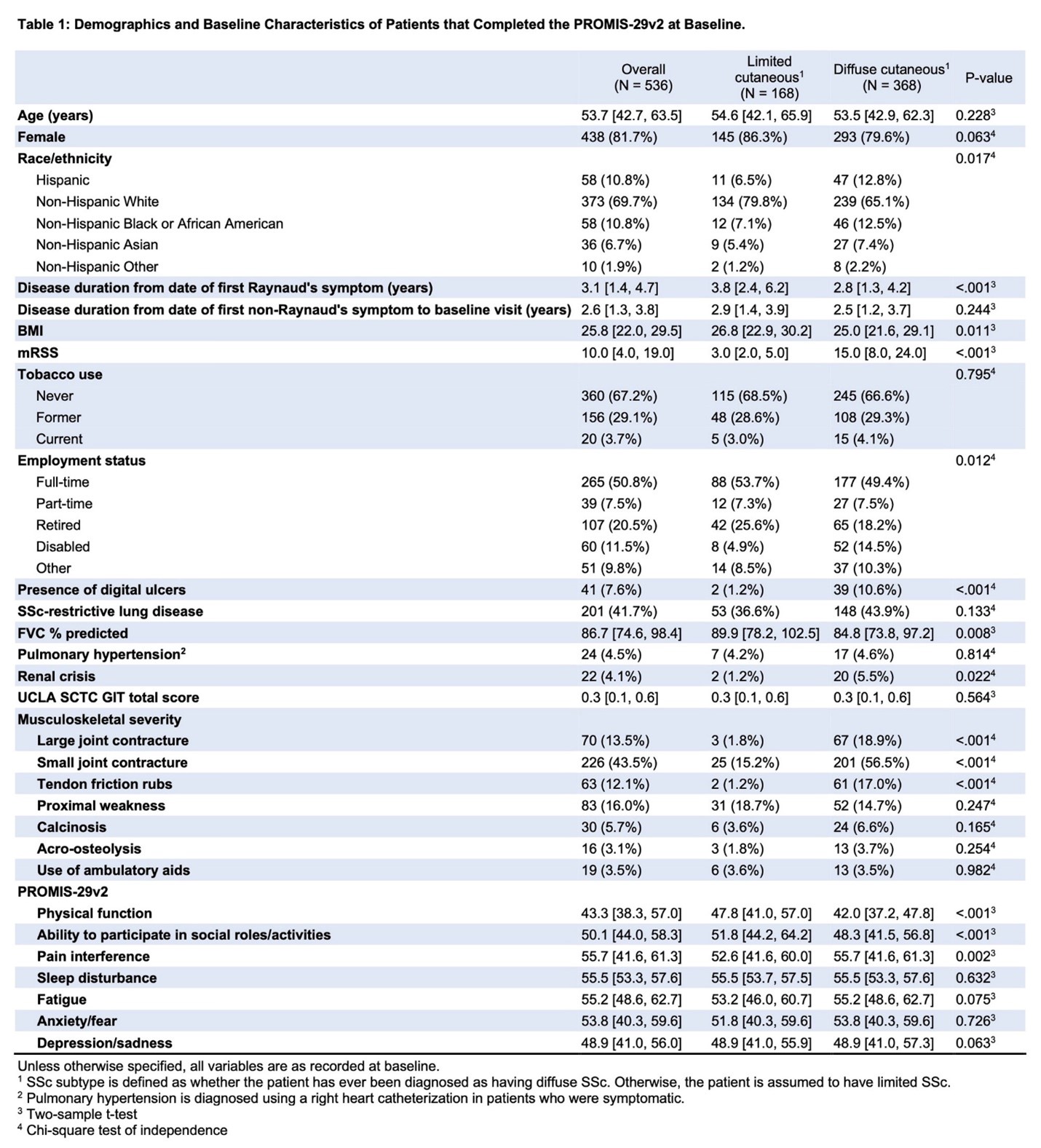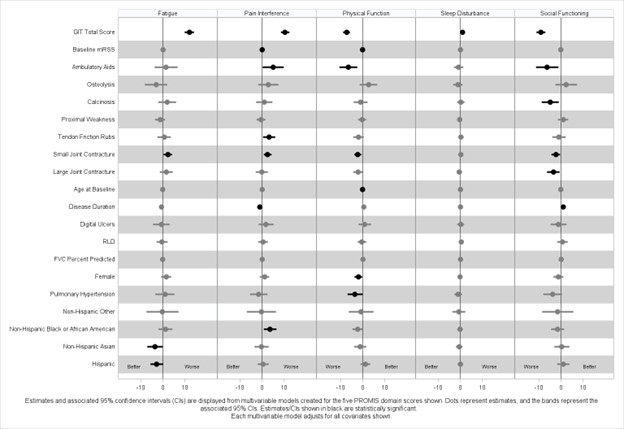Session Information
Session Type: Poster Session A
Session Time: 10:30AM-12:30PM
Background/Purpose: Early years of Systemic sclerosis (SSc) are typically the period of peak disease activity and associated with greater pain, fatigue, sleep disturbance, physical impairment, anxiety, and body image distress. Using the Patient-Reported Outcomes Measurement Information System-29 version 2.0 (PROMIS-29v2), a patient-centered questionnaire used to assess health-related quality of life (HRQoL) our study evaluated physical and mental health in 7 domains and their clinical correlates in the Collaborative National Quality and Efficacy Registry (CONQUER), a multi-center US-based registry of patients with early limited cutaneous (lc) and diffuse cutaneous (dc) SSc.
Methods:
Patients enrolled in CONQUER meet 2013 ACR-EULAR Classification criteria for SSc and have a disease duration of less than 5 years from their first non-Raynaud SSc symptom. Baseline results of the PROMIS-29v2 domains of physical function (PF), social function (SF), pain interference, fatigue, anxiety/fear, sleep disturbance, and depression were described for the entire CONQUER cohort and compared between patients with lcSSc and dcSSc using two-sample t-tests. Multivariable logistic regression models assessed the relationship between subject characteristics, UCLA SCTC GIT 2.0 score, mRSS, musculoskeletal activity, and PROMIS domain scores.
Results: Baseline data were available for 536 SSc patients (Table 1) enrolled, of whom 368 (68.7%) had dcSSc. Disease duration from first non-Raynaud’s symptom was 2.6 [1.3, 3.8] years and similar between lcSSc and dcSSc. While patients with dcSSc had significantly worse PF, SF and pain interference in comparison to lcSSc, significant differences were not seen for fatigue, anxiety/fear, sleep disturbance and depression.
The UCLA SCTC GIT 2.0 score was significantly associated with several domains in multivariable modeling. Higher GIT scores, which indicated worse GI functioning, were associated with greater fatigue, pain interference, and sleep disturbance, as well as poorer PF and SF (Figure 1). Higher mRSS was associated with worse PF and greater pain interference. Musculoskeletal involvement also showed statistically significant relationships with PROMIS-29v2 domain scores. The presence of small joint contractures and use of ambulatory aids were associated with worse scores in several domains. Such relationships were consistent in findings from univariable modeling.
Conclusion: In this large US based cohort of patients with early SSc, presence of diffuse cutaneous disease, musculoskeletal manifestations, higher GIT score, and higher mRSS were associated with worse HRQoL as measured by PROMIS-29v2.
To cite this abstract in AMA style:
Makol A, Lamba I, Khanna D, VanBuren J, Child A, Alvey J, Assassi S, Bernstein E, Castelino F, Chung L, Evnin L, Frech T, Hant F, Hummers L, Lakin K, Lebiedz-Odrobina D, Luo Y, Molitor J, Moore D, Richardson C, Sandorfi N, Shah A, Shah A, Skaug B, Steen V, Volkmann E, Gordon J. Clinical Correlates of Physical and Mental Health in Early Systemic Sclerosis: Data from the Collaborative National Quality and Efficacy (CONQUER) Registry [abstract]. Arthritis Rheumatol. 2024; 76 (suppl 9). https://acrabstracts.org/abstract/clinical-correlates-of-physical-and-mental-health-in-early-systemic-sclerosis-data-from-the-collaborative-national-quality-and-efficacy-conquer-registry/. Accessed .« Back to ACR Convergence 2024
ACR Meeting Abstracts - https://acrabstracts.org/abstract/clinical-correlates-of-physical-and-mental-health-in-early-systemic-sclerosis-data-from-the-collaborative-national-quality-and-efficacy-conquer-registry/


